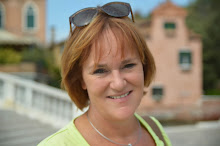Artworks are made by students of grade 3
You need:
- coloured paper A4 size
- white drawing sheet A4 size
- newspaper
- ruler and pencil
- glue
- crayons
- glitter
- colour markers
.JPG) Show artwork of Liechtenstein on the digital board and discuss the characteristics: primary colours sometimes with green, text balloons, raster dots as we know from newspaper photographs and thick black outlines. Show comic balloons from Lichtenstein and discuss them.
Show artwork of Liechtenstein on the digital board and discuss the characteristics: primary colours sometimes with green, text balloons, raster dots as we know from newspaper photographs and thick black outlines. Show comic balloons from Lichtenstein and discuss them. In this lesson students create a comic balloon like Lichtenstein did. Choose for a basic form, a star or cloud. See my 'how to draw a star step by step' below.
Cut this or cloud out of coloured paper. Cut another cloud or star from a newspaper. Draw an action word on the white sheet and colour with markers. Cut this word. Create composition and paste the parts of the artwork. Draw action stripes with black crayon or use glitter.
How to draw a star:
2. Draw lines from the edges to the circle, using pencil and ruler. See the black lines in the picture.
3. Draw lines from the same places but make them diagonal. See the red lines in the picture.
4. Cut the parts between the triangles, the blue pieces in the picture.

.jpg)



Way cool! I love this. I will want to try this some day. Thanks for sharing.
BeantwoordenVerwijderenI am looking for a Roy L project! Thanks
BeantwoordenVerwijderencorioconnell.blogspot.com